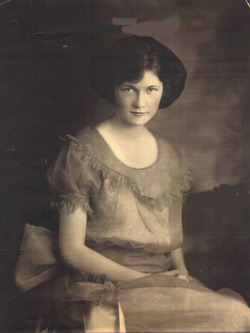The following article was written by my friend, Tom Fiske.
 Today in a fit of bad old memories I recalled the kinds of things my parents would say as I was growing up. There were three of us mean little boys in the house (no sisters) and thus no model kids for us kids to emulate. I think the expression my dad used about us was “Hell on wheels,” which I presumed was a lot worse than Hell on Crutches or some such thing.
Today in a fit of bad old memories I recalled the kinds of things my parents would say as I was growing up. There were three of us mean little boys in the house (no sisters) and thus no model kids for us kids to emulate. I think the expression my dad used about us was “Hell on wheels,” which I presumed was a lot worse than Hell on Crutches or some such thing.
My pretty and dainty mother was reduced to threats such as “I’m going to tan your hide.” This was in the general category of such comments as “I’ll be forced to beat bumps on your head.” She was a soft spoken southern lady who was not easily provoked, but there were three of us imaginative Huck Finn types doing the provoking.
I do not feel good or bad about the way we treated our parents. It’s just that there was a lot of collateral damage in those days and our parents caught the brunt of it. What I really feel bad about is that I did not collect all the sayings our parents used. I really believe that if I could capture those words, I could present an accurate picture of what they were like.
It is important for all of us to collect those expressions while we can, because what people say tells a lot about them and allows others to see them the way they really were.
For instance, my father went through a period of a year or so in which he would end an explanation with, “Don’t you see.” It was not a question but a statement and it made him sound very professorial. He was one of those men who used an initial and then his middle name as a first name. His father did the same, becoming G. Walter Fiske when it suited him. It sounded pretentious to me, but perhaps I did not understand. My older brother, a very good mimic, began copying him and Dad gave it up. I think he began to not like the sound of it coming from my brother. He switched to such comments as “Lord love a duck!”
 And my mother would say such things as “Lowsy me,” as she aged, which was a deep-fried southern expression that meant something like, “For heaven’s sake!”
And my mother would say such things as “Lowsy me,” as she aged, which was a deep-fried southern expression that meant something like, “For heaven’s sake!”
What were some of the other expressions? “Wait until your father comes home!” was full of meaning for all of us. It was a general alert that cast a cloud of doom on the offender and caused the other two boys to scatter until just before dinner began.
“It’s good for you and will help you, too,” mother would say when the cod liver oil came out of the refrigerator. Oh, did I ever hate that stuff!
If all that weren’t enough, Mother used a lot of French words and pronounced them correctly, while Dad carried on short conversations with us in German. He had a German-American mother and he took German in college, while Mother took French in “finishing school,” whatever that was. Mother didn’t swear in any language, but Dad chose to do his swearing in English. I always felt my education was abbreviated because I could not swear in German. The Germans sounded more elegant to me when they swore.
Of course there were non-verbal expressions, such as the slow deliberations surrounding the choice of a willow branch with which to switch one or all of us, or choosing an adequate gentleman’s belt when capital punishment was called for.
Did we resent our parents and lash out against society? No, of course not. Nearly every boy we knew suffered the same. It was just part of growing up. In high school, for instance, I was quite good at grabbing my ankles while a teacher bashed me in the rear with a paddle. It smarted and I got smarter as time went on. In my senior year I was not paddled at all.
But I digress. I have been keeping a small booklet full of my parent’s and their parent’s comments. When I do write about my parents I will be able to describe them well, but more importantly, will be able to let them describe themselves by revealing the words they chose to use in everyday conversation.
Maybe this will not be as important as telling how they responded to the poor and those of different races and religions, but it will help round out the image I am trying to present. Perhaps it is a favor returned because they cared enough to straighten us out when we strayed from the straight and narrow.
Whatever the case I do it out of love and amusement, too. Maybe my children and grandchildren will understand me better as a result.
I love this! I just wish I could capture the tone of my little grandmother when she said her unique phrases!
Thank you Suzannah. I find I forgot several such as, “I know it’s so.” Mother said it in such a way that I understood her to mean, “Not in this lifetime, buster.”
Tom
Enjoyed that. My parents were full of “children were made to be seen and not heard” and “go to your room”. As an only child it was hard to be alone even more than I already was! Also up there was, “you’ll understand when you’re in my shoes”. I never did.
“Don’t you know?” 😉
My father’s favorite saying, which I think often myself was “If you want it done right, do it yourself.” I think it often, but don’t say it very often, because it’s not very popular with people I might say it to.
Dear Lynn,
My feet were too big for anyone in the family, so I was unable to wear any of their shoes. You probably did not have that problem.
Yes! Tone is part of the equation. I wish I had noted that.
Dear JC,
You have to remember that your father’s generation was a very self-reliant one, while later generations have come to rely on Government and institutions to do things for them. My father could make anything except his tongue work well. He called me “Jim, Bob, Tom” most of the time because I was the last of three boys who were making problems in some way. One day he turned kind of red in the face and yelled, “SPEAK TO ME WHEN I LOOK AT YOU!” Fortunately he had a good sense of humor.